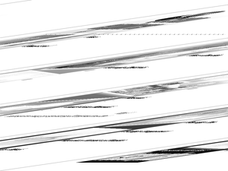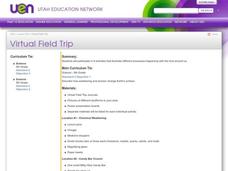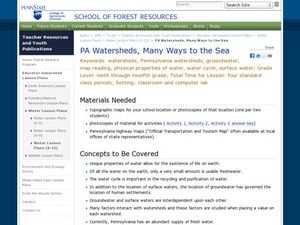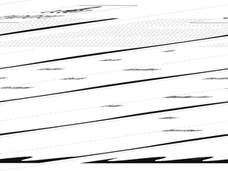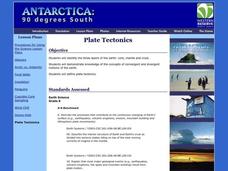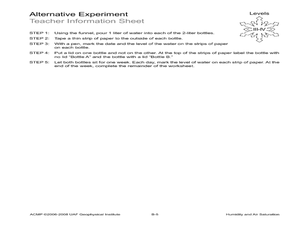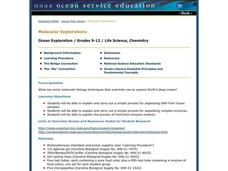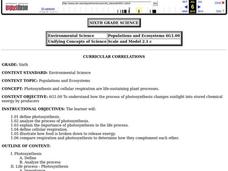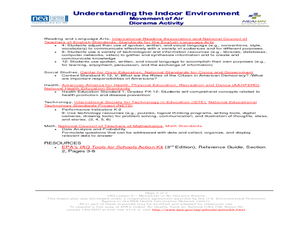Curated OER
Celebrating the Solstice and Equinox
Fourth graders graph the number of daylight hors throughout the year and examine why day length varies. They discover that seasonal changes and latitude on Earth affect the number of hours of daylight in each day. Students listen to...
Curated OER
The Chemosynthetic Cafe
Learners study photosynthesis and chemosynthesis. For this chemosynthetic lesson students explain the processes of these and define terms.
Curated OER
Writing about the climate
Students research the contributing factors to the Earth's paleoclimate. They determine the relevant climate data and use it to construct a science argument. In the process, they access data, capture images of the data plots, and...
Curated OER
My Friend, The Volcano
Students describe the positive impacts of volcanic activity on marine ecosystems. For this volcano lesson students explore the process that causes volcanic activity along the Mariana and Kermadec Island Arcs.
Curated OER
Weather Tools
Learners explore Earth science by participating in a weather identification activity. In this scientific instrument lesson, students identify several weather related tools such as the weather vane, thermometer and rain gauge. Learners...
Curated OER
Virtual Field Trip
Fifth graders are introduced to the concepts of weathering and erosion. In groups, they rotate between different stations to discover how each process effects different landforms. To end the lesson, they discuss each change in the...
Curated OER
PA Watersheds, Many Ways to the Sea
High schoolers examine the water cycle and the factors that interact with watersheds. In this watersheds lesson students describe the purification process, trace the flow of infiltrate water through aquifers, and research the Internet...
Curated OER
What is a Karst?
Students examine the process that creates limestone. In this limestone lesson students complete a worksheet and participate in a lab activity.
Curated OER
Dating Popcorn
Learners simulate the dating process with popcorn. In this geology lesson, students discuss how geologist find the age of rocks by gauging the amount of decay of radioactive elements. They have 6 bags of popcorn and each group microwaves...
Curated OER
Plate Tectonics
Students identify the three layers of the earth: core, mantle and crust. They demonstrate knowledge of the concepts of convergent and divergent motions of the earth and an understanding of plate tectonics.
Curated OER
Humidity and Air Saturation
Students experiment with air saturation. In this earth science lesson, students first complete an activity which teaches humidity. Then they use the scientific method to create their own experiments to test how long it takes a 2-liter...
Curated OER
Water, Water Everywhere
Young scholars explore water. In this water cycle lesson, students conduct a scientific investigation that requires build a terrarium models of the earth. Young scholars record their observations of the changes regarding water in the...
Curated OER
Molecular Explorations
Young scholars explain the processes for separating DNA from tissue and separating complex mixtures. In this exploratory instructional activity students complete a lab where they extract DNA.
Curated OER
Getting to Know Soil
Students make predictions and analyze soil. In this soil properties lesson plan, students make predictions about soil properties for various soil samples. Students examine the types of soils and record their observations. Students...
Curated OER
Motions and Forces
Sixth graders investigate the construction of a magnet and the force it produces. They identify various materials as magnetic or non-magnetic, discuss the properties of magnetic properties, and conduct an experiment with a compass and...
Curated OER
Space Science: A Scoop of Moon Dirt
Students discover soil characteristics and how it is formed on Earth and the Moon by examining local samples to a lunar simulant. They replicate the effects of wind erosion by scraping dry bread with sandpaper. Students use rocks and...
Curated OER
Seafloor Block Model
Pupils construct a 3-D block model of the ocean floor to study fundamental earth processes. This is a preconstructed cut out that allows the students to put it together but then to add their own colors as well. There is an evaluation...
Curated OER
Shadow Trackers
Students use online websites to inquire about the cycle of day and night. In this web based lesson, students are able to see the movement of the sun and Earth. Students can look at different parts of the Earth as if they were on the Sun...
Curated OER
Photosynthesis
Sixth graders are introduced to the process of photosynthesis by discussion and then by participating in an experiment. They then answer questions as independent practice project.
Curated OER
Movement of Air Diorama Activity
Pupils make a diorama to illustrate the process of mechanical airflow. In this movement of air lesson, students discuss ventilation and air movement indoors. Pupils discuss ventilation systems and study pictures of the systems. Students...
Curated OER
The Big Burp:A Bad Day in the Paleocene
Pupils describe the overall events that occurred during the Paleocene extinction event as well as the processes that are believed to result in global warming after group research. They infer how a global warming event could have...
Curated OER
World Geography: Climate Change Round Table
Students are able to explain the suspected causes of relatively recent climate changes, specifically the observed global warming. They discuss how unusual or extreme global warming disrupts the balance of the earth's geo-spheres.
Curated OER
Comparing Land Views of Different Cultures
Young scholars research various legends and write a script based on that legend. In this cultural awareness lesson, students read the Native American legend telling of the origin of the earth. Young scholars analyze how the concepts in...
Curated OER
Water Cycle and Ecosystems
Students explore the water cycle. In this investigative lesson, students examine the water cycle process. They will record their observations and discuss marine and freshwater ecosystems.



